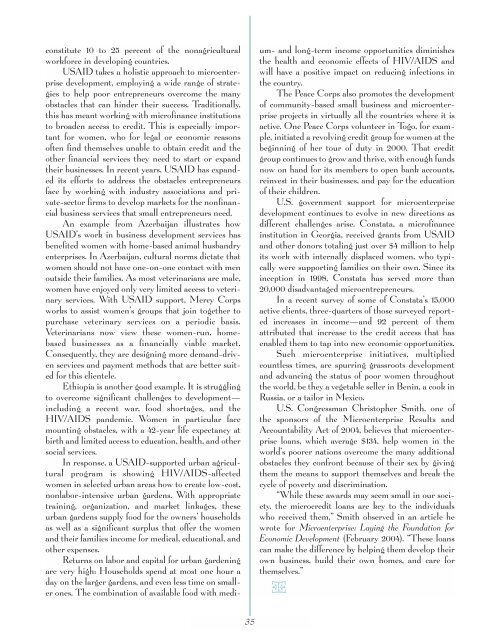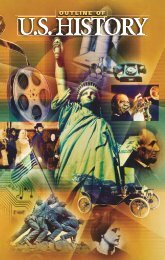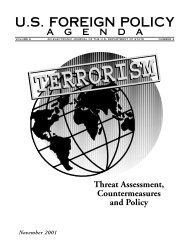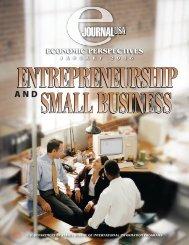Working for Women Worldwide - Embassy of the United States
Working for Women Worldwide - Embassy of the United States
Working for Women Worldwide - Embassy of the United States
Create successful ePaper yourself
Turn your PDF publications into a flip-book with our unique Google optimized e-Paper software.
constitute 10 to 25 percent <strong>of</strong> <strong>the</strong> nonagricultural<br />
work<strong>for</strong>ce in developing countries.<br />
USAID takes a holistic approach to microenterprise<br />
development, employing a wide range <strong>of</strong> strategies<br />
to help poor entrepreneurs overcome <strong>the</strong> many<br />
obstacles that can hinder <strong>the</strong>ir success. Traditionally,<br />
this has meant working with micr<strong>of</strong>inance institutions<br />
to broaden access to credit. This is especially important<br />
<strong>for</strong> women, who <strong>for</strong> legal or economic reasons<br />
<strong>of</strong>ten find <strong>the</strong>mselves unable to obtain credit and <strong>the</strong><br />
o<strong>the</strong>r financial services <strong>the</strong>y need to start or expand<br />
<strong>the</strong>ir businesses. In recent years, USAID has expanded<br />
its ef<strong>for</strong>ts to address <strong>the</strong> obstacles entrepreneurs<br />
face by working with industry associations and private-sector<br />
firms to develop markets <strong>for</strong> <strong>the</strong> nonfinancial<br />
business services that small entrepreneurs need.<br />
An example from Azerbaijan illustrates how<br />
USAID’s work in business development services has<br />
benefited women with home-based animal husbandry<br />
enterprises. In Azerbaijan, cultural norms dictate that<br />
women should not have one-on-one contact with men<br />
outside <strong>the</strong>ir families. As most veterinarians are male,<br />
women have enjoyed only very limited access to veterinary<br />
services. With USAID support, Mercy Corps<br />
works to assist women’s groups that join toge<strong>the</strong>r to<br />
purchase veterinary services on a periodic basis.<br />
Veterinarians now view <strong>the</strong>se women-run, homebased<br />
businesses as a financially viable market.<br />
Consequently, <strong>the</strong>y are designing more demand-driven<br />
services and payment methods that are better suited<br />
<strong>for</strong> this clientele.<br />
Ethiopia is ano<strong>the</strong>r good example. It is struggling<br />
to overcome significant challenges to development—<br />
including a recent war, food shortages, and <strong>the</strong><br />
HIV/AIDS pandemic. <strong>Women</strong> in particular face<br />
mounting obstacles, with a 42-year life expectancy at<br />
birth and limited access to education, health, and o<strong>the</strong>r<br />
social services.<br />
In response, a USAID-supported urban agricultural<br />
program is showing HIV/AIDS-affected<br />
women in selected urban areas how to create low-cost,<br />
nonlabor-intensive urban gardens. With appropriate<br />
training, organization, and market linkages, <strong>the</strong>se<br />
urban gardens supply food <strong>for</strong> <strong>the</strong> owners’ households<br />
as well as a significant surplus that <strong>of</strong>fer <strong>the</strong> women<br />
and <strong>the</strong>ir families income <strong>for</strong> medical, educational, and<br />
o<strong>the</strong>r expenses.<br />
Returns on labor and capital <strong>for</strong> urban gardening<br />
are very high: Households spend at most one hour a<br />
day on <strong>the</strong> larger gardens, and even less time on smaller<br />
ones. The combination <strong>of</strong> available food with medium-<br />
and long-term income opportunities diminishes<br />
<strong>the</strong> health and economic effects <strong>of</strong> HIV/AIDS and<br />
will have a positive impact on reducing infections in<br />
<strong>the</strong> country.<br />
The Peace Corps also promotes <strong>the</strong> development<br />
<strong>of</strong> community-based small business and microenterprise<br />
projects in virtually all <strong>the</strong> countries where it is<br />
active. One Peace Corps volunteer in Togo, <strong>for</strong> example,<br />
initiated a revolving credit group <strong>for</strong> women at <strong>the</strong><br />
beginning <strong>of</strong> her tour <strong>of</strong> duty in 2000. That credit<br />
group continues to grow and thrive, with enough funds<br />
now on hand <strong>for</strong> its members to open bank accounts,<br />
reinvest in <strong>the</strong>ir businesses, and pay <strong>for</strong> <strong>the</strong> education<br />
<strong>of</strong> <strong>the</strong>ir children.<br />
U.S. government support <strong>for</strong> microenterprise<br />
development continues to evolve in new directions as<br />
different challenges arise. Constata, a micr<strong>of</strong>inance<br />
institution in Georgia, received grants from USAID<br />
and o<strong>the</strong>r donors totaling just over $4 million to help<br />
its work with internally displaced women, who typically<br />
were supporting families on <strong>the</strong>ir own. Since its<br />
inception in 1998, Constata has served more than<br />
20,000 disadvantaged microentrepreneurs.<br />
In a recent survey <strong>of</strong> some <strong>of</strong> Constata’s 15,000<br />
active clients, three-quarters <strong>of</strong> those surveyed reported<br />
increases in income—and 92 percent <strong>of</strong> <strong>the</strong>m<br />
attributed that increase to <strong>the</strong> credit access that has<br />
enabled <strong>the</strong>m to tap into new economic opportunities.<br />
Such microenterprise initiatives, multiplied<br />
countless times, are spurring grassroots development<br />
and advancing <strong>the</strong> status <strong>of</strong> poor women throughout<br />
<strong>the</strong> world, be <strong>the</strong>y a vegetable seller in Benin, a cook in<br />
Russia, or a tailor in Mexico.<br />
U.S. Congressman Christopher Smith, one <strong>of</strong><br />
<strong>the</strong> sponsors <strong>of</strong> <strong>the</strong> Microenterprise Results and<br />
Accountability Act <strong>of</strong> 2004, believes that microenterprise<br />
loans, which average $134, help women in <strong>the</strong><br />
world’s poorer nations overcome <strong>the</strong> many additional<br />
obstacles <strong>the</strong>y confront because <strong>of</strong> <strong>the</strong>ir sex by giving<br />
<strong>the</strong>m <strong>the</strong> means to support <strong>the</strong>mselves and break <strong>the</strong><br />
cycle <strong>of</strong> poverty and discrimination.<br />
“While <strong>the</strong>se awards may seem small in our society,<br />
<strong>the</strong> microcredit loans are key to <strong>the</strong> individuals<br />
who received <strong>the</strong>m,” Smith observed in an article he<br />
wrote <strong>for</strong> Microenterprise: Laying <strong>the</strong> Foundation <strong>for</strong><br />
Economic Development (February 2004). “These loans<br />
can make <strong>the</strong> difference by helping <strong>the</strong>m develop <strong>the</strong>ir<br />
own business, build <strong>the</strong>ir own homes, and care <strong>for</strong><br />
<strong>the</strong>mselves.”<br />
Z<br />
35












